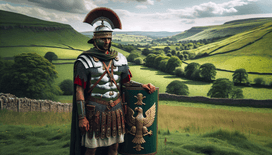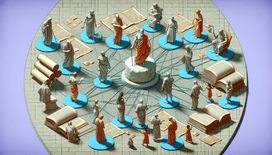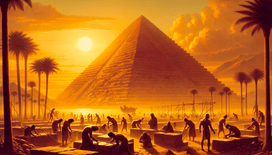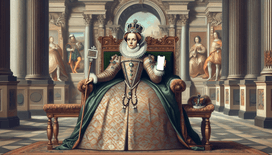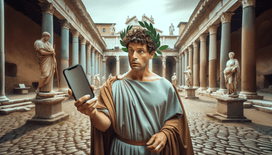Ah, the age of exploration! A time when fearless adventurers donned their fanciest pantaloons, mustered their maritime courage, and set sail into the wide blue unknown, hoping to discover new worlds. But what if Christopher Columbus, that intrepid navigator of old, had possessed the wonders of modern navigational technology at his fingertips? Let us embark upon this delightful voyage of alternate reality, where Compass Columbus is but a shrivelled relic in the shadow of GPS-guided glory!
The Lure of the Indies, and Turning the Map on Its Head
Let’s rewind our clocks to the year 1492, the dawn of Columbus' famous voyage, but twist the dial of innovation to include the Global Positioning System. Imagine Columbus taking a deep breath, standing on the deck of the Santa María, with his trusty crew (and perhaps less-trusty maps) ready for adventure. Just before pushing off, he whips out a sleek GPS device - polished, metallic, resembling a small piece of sorcery to those 15th-century minds.
“No need for convoluted detours today, gentlemen!” Columbus might declare, flourishing the device with the flourish of a seasoned wizard. “The Indies lie this way, I’m certain of it!”
Columbus’ historical struggle, as fans of alternative rerouting might know, was the eternal tug-of-war with the compass and astrolabe, not to mention wildly inaccurate cartographers who depicted dragons wherever ink ran out on the map. Here, however, Columbus' contemporary laurels would rest upon satellites beaming his precise location straight from the ethereal heavens. Not much room for mythical sea monsters when GPS prompts liberate the truly outlandish.
"Recalculating Route" and the Disappearance of the Americas
In our imagined scenario, would Columbus have ever chanced upon the Americas at all? With GPS muttering reassuringly about the optimal path to the riches of Asia, this voyage could have been as uneventfully profitable as a modern-day Sunday drive to the local supermarket. “In one thousand nautical miles, bear left… then continue straight, and straight, and straight,” purrs the GPS, dismissively. Frankly, the American Continent seems ever so slightly surplus to requirements!
We, the gleeful historians they never imagined, might wonder where our New World would have stood without Columbus accidentally crashing into it - what with the glaring absence of his initially confused yet arguably opportunistic presence. Little did he know, stranded relics of the first Lunchables, sorry, Lunchables did not exist in the 15th century, but rather those staple provisions upon which his legacy nibbled. Chicken, spices, perhaps even taco ingredients never fancied stepping foot on Iberian soil!
Mutiny Avoided: The Crew in Crisis, Calmed by Convenient Technology
It’s well-known that Columbus’ crew, at times, threatened mutiny. The sailors were understandably antsy after weeks at sea with no land in sight, entertaining visions of themselves as breakfast offerings to Poseidon. With access to GPS, this merry band of sea-weary seafarers might have found solace and assurance emanating from the digital voice guiding them. Less would have been left to chance when each shipmate could take turns gazing at the precise ETA to the Spice Islands, at least if not furtively Googling what in creation ‘ETAs’ meant via their smartphones.
“Fear not!” their captain would conclude at nightly briefings. “For today, our friend of the future has indicated we’re exactly on course!” Perhaps even a daily horoscope via their navigation app, bolstering morale with promises of steady winds (or at least avoiding scurvy by diligently logging their Vitamin C intake via fitness tracker).
Columbian Consequences: An Evolving Narrative
Setting aside mutiny and GPS-guided adventures, this alteration ripples across the annals in a cascade of ifs, whats, and maybes. Without Columbus stumbling into the Bahamas, the feuding European powers might have taken markedly different approaches to exploration, and exploitation. While the Santa María navigated otherwise wastelands without adrift temptations, maritime competition could have sped towards new territories at breakneck velocity.
Oh, the whimsical saga unfolds! In our time-bending tale, the sweet scent of spices may have perfumed the shores of Iberia earlier, yet the absence of European settlers redefining the landscape of the Americas means maps themselves would demand a poignant revision even later. This, dear reader, is history brewing! Incessant rerouting still knocks on fate’s questionably whimsical door.
Conclusion: Navigating the Endless Ocean of Possibilities
While it’s marvellous to ponder what Columbus’ GPS-guided quest might have achieved, we must all appreciate his daring real-world feats, laced as they were with delightful irony and ceaseless exploration. Yet in consideration of how modern-day technology could have shaped history, our imagination paves the ocean not with roads but with delightful maybes and could-have-beens, forging new networks of intrigue upon this whimsical cartographer's canvas.
So, what next? Perhaps reconsidering Gutenberg with an Amazon Prime account, or Isaac Newton contemplating gravity shifts via virtual reality! History’s HGV driver meets historian whose vision became boundless only because reality superbly insisted. Until our next wonder-laden excursion, dear adventurers, keep your maps held high, until, that is, the next GPS prompt arrives.


